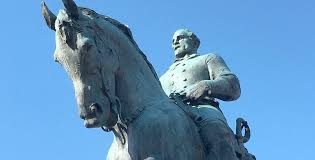Bill Ward: Truth in history
Published 8:50 pm Monday, January 15, 2018

- The statue of Robert E. Lee in Charlottesville will come down.
By Bill Ward
Special to the Salisbury Post
Hillary Clinton and Diane Feinstein, among others, have said that the United States Constitution is a living, breathing instrument that should be changed periodically. Those of us who believe in a strict rule of Constitutional law disagree vociferously by insisting on maintaining the Constitutional status quo. Can you imagine a more direct route to the death of the Second Amendment or radical changes to the Fourth, Fifth and perhaps even the First Amendment?
Yet there are those who would change history, as well. It has been done before. Two well-known historians at prominent Ivy League schools have admitted in years past to taking liberties in writing history, especially that pertaining to The War for Southern Independence. And they are just on the surface.
In a recent column, I wrote about a TV news announcer, commentator or “talking head,” a nice way of referring to him. A reader chose to get into the semantics of those terms defining a TV announcer and upbraid me for not conforming to his interpretation of what history should be.
The subject of the announcer’s diatribe was Robert E. Lee, who was discussed because of the protest of the removal of Lee’s statue in Charlottesville, Va. I did not mind the disagreement with my column. What bothered me was the description of history laid out to the public, including students and their teachers. It’s bad enough that history is taught the way it is, but when people feed on the erroneous methods of teaching for some agenda, then I must object.
Here is what the reader wrote: “Mr. Ward, while I appreciate your views, I don’t see the point…. As a historian, you must certainly be aware that history is a social construction, not a fixed assemblage of factual details. As society changes over time — and it does change — history changes as well. Later generations are free to arrive at different interpretations from their fathers and grandfathers…. Lee? He inhabited his own time as well. In the 21st century, there’s more than one lesson to be learned from the man’s actions. He certainly wasn’t solely responsible for 4 years of carnage, but he had a hand in it.”
History, on a contemporary basis, is created in the events we live on a day-by-day basis. As to the teaching of 18th and 19th century history, teachers, unfortunately, teach the way their teachers taught them, the way their teachers taught them, the way their teachers taught them, and so on down the line. Over the years, I have been contacted by some young PhD types teaching on the college level. Concerning columns that I have written, they told me that they would like to teach “real history,” but they would be violating school policy, and they were afraid for their jobs. Unbelievable!
What struck me most about my reader’s writing was his statement, “that history is a social construction, not a fixed assemblage of factual details. As society changes over time — and it does change — history changes as well.” That’s preposterous.
Does that mean there is now some doubt that the War for Southern Independence began in 1861? Or going back farther, that Aaron Burr had nothing to do with killing Alexander Hamilton in a duel? That is kind of gruesome for children to be studying in history.
History is what it is, and trying to change it is a foolish endeavor. When Douglas Southall Freeman wrote “R.E. Lee: A Biography,” in four volumes (Pub. 1935), just part of Freeman’s research included four years of studying Lee’s personal and official papers and letters. That was prior to putting pencil to paper.
I still find a great deal of satisfaction reading through the “O.R.” or “Official Records” and being confronted by the actual words that were written by people on both sides of that great conflict between 1861 and 1865. Leave history alone to simmer in the nectar of its wisdom, so future generations can partake of the knowledge it offers. That will then prevent us, as my reader wrote, from “puffing up a historical figure into a demigod far beyond his human achievements or failings.” Although one definition of demigod is “a man who is greatly admired or respected.” Such a man was Robert E. Lee
To use the often-quoted George Santayana, from his multi-volume book, “The Life of Reason:” “Those who cannot remember the past, are condemned to repeat it.”
Bill Ward is a historian and an MIT-trained technical writer. Email him at wardwriters@carolina.rr.com.

